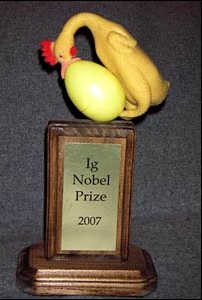The Befouled Weakly News
7 October 2007
What a great weekend. I refer, of course, not to the weather but to the great weekend of sport we’ve enjoyed so far with more to come this evening. Come to think of it, since I usually start with the weather – what a crap weekend this has been in marked contrast to a glorious couple of Autumn days. The forecast (of which we have learned to our cost to pay no attention to) promised bright sunshine and clear blue skies for both Saturday and Sunday; Saturday was grey and this morning looks much the same. It’s a good job the sport is so good then, isn’t it.
Love to you all, Greg Jacob considers himself to be one of the lucky ones because he's the only one of his family to have survived two years in a concentration camp. He's now nearing 90 and his only remaining joy is the national lottery, which he's been playing for years without success. But then he wins the big one, a prize of $10 million. A journalist from the Times calls on him for a story. Jacob tells him, "As I'm the only one in my family to have survived the concentration camps, this has helped me decide how to make use of my large win. So, I've decided to donate $5 million to the Save the Children Fund, $3 million to the Simon Wiesenthal Centre, $750,000 to the Jewish Museum, $750,000 Hadassah Hospital and $500,000 to be shared amongst my friends. I'm also thinking of donating $1 to the Nazi Party from my winnings." The journalist is surprised. "But Jacob, how can you think of donating even $1 to the Nazi party after everything that's happened to you and your family?" Jacob rolls up his sleeve, points to his arm, smiles and replies, "It's only fair. They gave me the winning numbers." Women are like apples on trees. The best ones are at the top of the tree. Most men don't want to reach for the good ones because they are afraid of falling and getting hurt. Instead, they sometimes take the apples from the ground that aren't as good, but easy. The apples at the top think something is wrong with them, when in reality, they're amazing. They just have to wait for the right man to come along, the one who is brave enough to climb all the way to the top of the tree. What are men like? Men are like a fine wine. They begin as grapes, and it's up to women to stomp the crap out of them until they turn into something acceptable to enjoy with dinner. A married couple was in a terrible accident in which the woman's face was severely burned. The doctor told the husband that they couldn't graft any skin from her body because she was too thin. The husband and wife agreed that they would tell no one about where the skin came from, and requested that the doctor also honour their secret. After the surgery was completed, everyone was astounded at the woman's new beauty. She looked more beautiful than she ever had before! All her friends and relatives just went on and on about her youthful beauty! One day, she was alone with her husband, and she was overcome with emotion at his sacrifice. She said, "Dear, I just want to thank you for everything you did for me. There is no way I could ever repay you." "My darling," he replied, "Think nothing of it. I get all the thanks I need every time I see your mother kiss you on the cheek." Back to the Befouled Weakly News Back to Greg's Temporary Home Page
|
